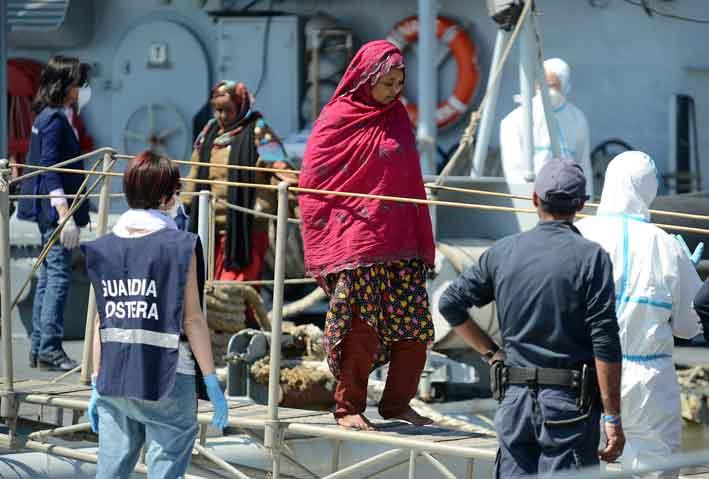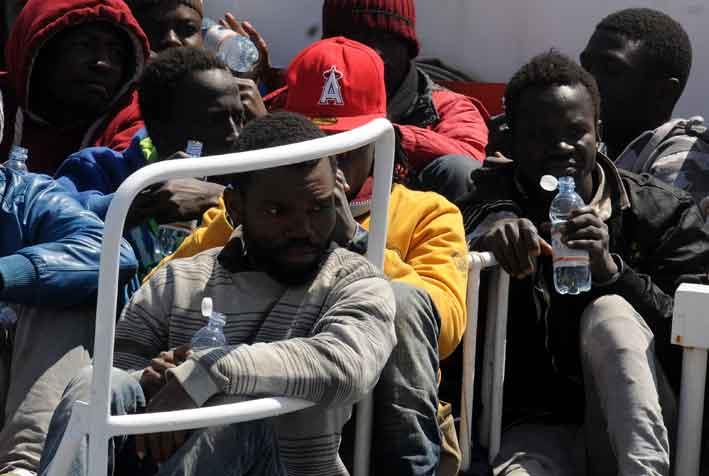Bound by the laws of the sea to help vessels in distress, shipping companies say Europe's migration crisis has placed unreasonable demands on their crews to act as lifesavers in the Mediterranean.
All too often merchant ships are diverted to help in large-scale rescue operations they are not properly equipped to handle safely because European governments haven't deployed enough resources to deal with the escalating problem, shipping officials say.
"We are perceived as a legitimate answer to this problem. We shouldn't be doing the rescuing in any case," said Dimitrios Banas of the European Community Shipowners' Associations.
Thousands of desperate migrants have perished in recent years trying reach European shores in overcrowded and unseaworthy vessels, including as many as 1,300 in the past week.
Of the 200,000 people rescued in the Mediterranean last year, about 40,000 were saved by merchant ships, according to the International Chamber of Shipping.

Crews say that they're happy to help whenever they can but don't want their efforts to become a systematic tool to deal with emergency situations best handled by professional search-and-rescue services.
"We place people on deck where there is room, we can give them some first aid and food but that is it," said Steffen Conradsen, risk manager at Maersk Line, the world's biggest shipping company.
One of Maersk's ships saved 429 shipwrecked migrants on April 10 and handed them over to Italian authorities, Conradsen said.
The Mediterranean is used heavily by container vessels that transport goods between Europe and Asia by means of the Suez Canal in Egypt. Both European and international shipowners' associations have called on the European Union to boost its search and rescue capabilities in the Mediterranean.
In a joint statement Tuesday, the International Chamber of Shipping and the European Community Shipowners' Associations said there's a need to clamp down on criminal people-smugglers and the root causes of the migrant flows from Africa, the Middle East and Asia.

"But the urgent and immediate priority is for EU member states to increase resources for search-and-rescue operations before thousands more people die," said ECSA Secretary General, Patrick Verhoeven.
Commercial shipping authorities might have been piqued when Italian Prosecutor Giovanni Salvi suggested that the Portuguese-flagged King Jacob that came to the rescue of a boat of migrants recently was to blame for the vessel's capsizing. He noted reports that the migrants had rushed to one side in a bid to be first off, destabilizing the ship and helping capsize it.
"Merchant ships don't have adequate preparation for rescues at sea, and that can result in a recue that isn't sufficient," he told a press conference Monday. "The fact is, rescues at sea are difficult and require professionalism."
He compared the King Jacob experience with the way the Coast Guard approaches vessels in distress, with small boats and microphones in which instructions are given in multiple languages for the migrants to stay seated and not move around.
A day later, Salvi's office backtracked. It issued a statement saying the ship had "in no way contributed to the fatal event" and stressing that the crew did the right thing by coming to the migrants' aid.

Italy used to have a robust and expensive search-and-rescue mission, called Mare Nostrum that however was politically unpopular and ended in 2014.
The EU's Frontex border patrol mission took over with limited mandate and resources, which have prevented it from being effective in saving lives.
That has put more pressure on merchant vessels, which "are not geared to handle hundreds of hungry, thirsty and traumatized refugees," said Anne H. Steffensen, head of the Danish Shipowners' Association. "The situation develops quickly right now and it increasingly becomes challenging for our members."
Another issue is the safety of the crew, said Simon Bennett, a spokesman for the International Chamber of Shipping. Huge cargo ships carrying thousands of containers with goods often have staff of up to 25, who suddenly may face hundreds of people "who are clearly traumatized, who are very often in a very bad physical state. That is a real challenge for the crew."
Taking part in a rescue operation also means delays that can prove costly for merchant ships on tight schedules.
"There are costs involved and at the moment they are borne by the industry," Bennett said, but added that "this is not our primary concern at the moment."